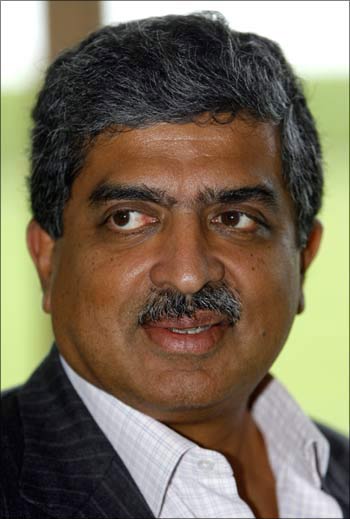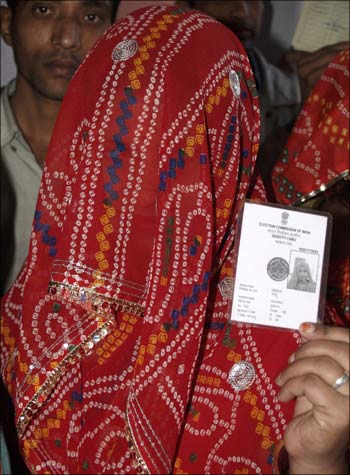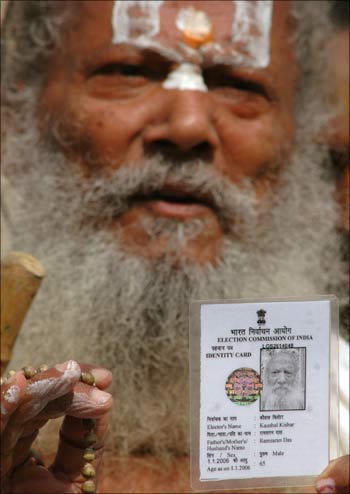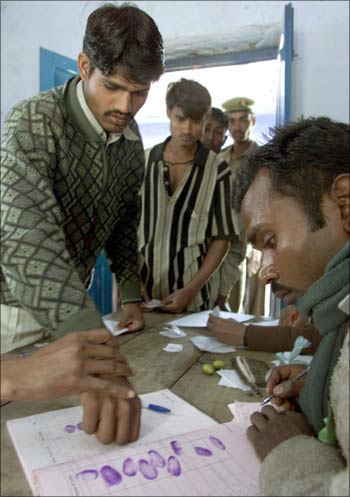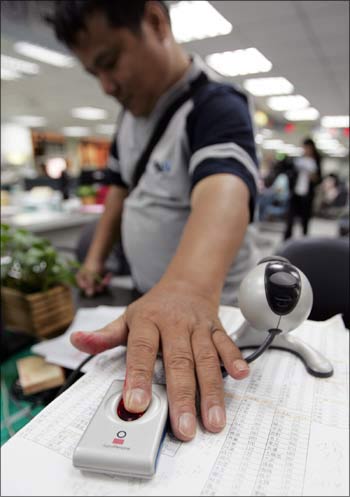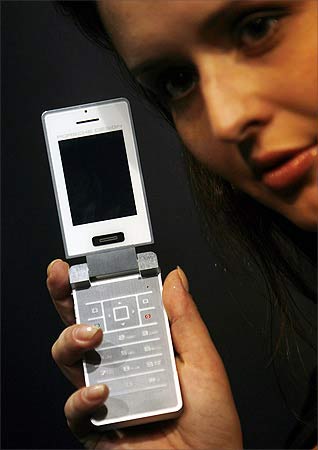 | « Back to article | Print this article |
Unique ID number: How it will help you!
Nandan Nilekani sits in the enclosed patio, looking out on to an expansive lawn. The late September sun, suggesting the warmth of autumn rather than the heat of the Delhi summer, plays on a garden framed by two giant, identical trees.
"It's the only perk of the job," the head of the Unique Identity project (christened Aadhaar) says, as he casts his eye over the pleasing scene.
Inside, the house no longer looks standard PWD. A designer friend has transformed it for the former Infosys chief executive, at his cost.
"I decided it was ok to splurge a little on myself," he says, as he settles down to the conversation. The only drink offered before lunch is a glass of water.
It's 14 months since Nilekani, now 55, decided to trade the life of a successful techie chieftain for official Delhi, a minefield for any interloper who dares to intrude.
Between then and now, Nilekani has built a core team of less than 200 people, spent less than Rs 100 crore, and is ready to roll out what is the world's most ambitious identity programme. The modest budget and the tight execution invite comparison with another project about to roll out in Delhi.
Click NEXT to read on . . .
Unique ID number: How it will help you!
On Wednesday, the Prime Minister and Sonia Gandhi will travel to remote Nandurbar (five hours by road from Aurangabad, if you travel like a commoner) to launch Aadhaar in a village where they will issue numbers real-time, and demonstrate banking inclusion at work.
Are you nervous, I ask. Not at all, he says. "At most, I will fail." But his manner does not suggest that possibility. As he talks, and talks, you realise there is carefully concealed excitement.
The roll-out will spread to seven states in a month or two, and by March-end several million numbers would have been issued. Firms like MindTree, Accenture, Cisco and others have been selected to develop the software, handle the biometrics, do the connectivity.
A contact centre has been roped in, so has the post office. And a couple of hundred agencies are being empanelled to enroll on behalf of registrars, like state governments and banks.
"We have also tapped into external capabilities by creating councils like an Awareness and Communications Strategy Advisory Council," he says, and adds that he has received a lot of informal advice from folks like Raghuram Rajan in Chicago and Abhijit Banerjee and Sanjay Sarma at MIT.
Click NEXT to read on . . .
Unique ID number: How it will help you!
Sitting at the centre of this network, which he says is instantly scalable through parallel processing, Nilekani is already thinking about his next steps.
But a funny thing happened along the way. The Infosys star, who developed a successful software services business because the sector had no government interference, has developed enormous respect for India's politicians.
He recalls a two-and-a-half hour grilling by the parliamentary standing committee for finance. Chief ministers like Nitish Kumar have also made an impact.
"These political leaders are on the ball, they work very hard, they ask the right questions, and they can see the possibilities. If you want agents of change, it's the politicians."
But how does he put together an effective project team within government recruitment rules and government salaries? With innovative flair, that's how.
Click NEXT to read on . . .
Unique ID number: How it will help you!
He took the help of the National Institute of Smart Governance in Hyderabad (did you know that one existed?) to, among other things, recruit people from outside the government system, and then turned to his network of contacts.
"I have got a brilliant IAS officer as our CEO and mission director, who has a deep understanding of technology."
He lists four categories of people -- volunteers, who come to work for free, people who have made their money internationally or here and want to contribute; interns from places like Delhi University and the Kennedy School at Harvard, who come for three-four months and presumably want the project on their CV; experienced people, who are on sabbatical from their companies, which continue to pay their salaries; and people from within the government system.
"Since all I can promise is hard work, and no power or perks, the guys who offer themselves are people who want to make a difference."
Although he has spent little money so far, the project will cost a few thousand crores--but cash is not a constraint. Vijay Kelkar's Finance Commission has already allocated Rs 3,000 crore (Rs 30 billion), and Pranab Mukherjee reacted to a report on budget cuts by publicly offering whatever money is needed.
Click NEXT to read on . . .
Unique ID number: How it will help you!
"I never even talked to him, he just issued a statement. And then he called me over to his office to reassure me."
That kind of support has come in part because Nilekani has seen marketing as part of his job. He is good with words and with people, and he has been careful to keep all important people briefed.
But selling to future partners has been the most important of all--since the project will make a difference only if the numbers are used.
And so, on Friday, he is meeting with the Reserve Bank and a dozen government-owned banks, to bring Aadhaar and banking together.
Getting cash or transferring money on a mobile phone, using the Aadhaar number for identification. Paying a cab driver by transferring money from your phone to his . . . The possibilities seem endless as he lists them.
Click NEXT to read on . . .
Unique ID number: How it will help you!
Then come the mobile phone companies, who issue some 15 million Sim cards every month. Half a million a day. They have to do identity checks on every customer, or pay a fine if something goes wrong. So, why not use the Aadhaar number as identification?
It will save the phone companies a ton of money, and trouble, and they become allies. That's Killer Application No 2.
There will be more, down the road. Like making the public distribution system work better. And the rural employment guarantee programme. And dovetailing with the National Population Register.
Grocers will arm themselves before long with a "micro-ATM" that is being designed to do the basic tasks, and costs Rs 10,000 or thereabouts -- so you can pay for groceries without using cash, by using the Aadhaar number.
Lunch is long over, and the conversation has drifted to other subjects. You think back to past projects that were transformational. Like the Green Revolution, ushered in by Normal Borlaug and MS Swaminathan, with C Subramanian's help.
Atomic energy in Bhabha's days. Perhaps even the Planning Commission of the 1950s, when the world's finest economists set up temporary home in Yojana Bhavan.
If Nilekani gets it right, and a billion numbers get issued, with real-time features (and therefore applications) that no one else has, he will have notched up his own transformational project.
